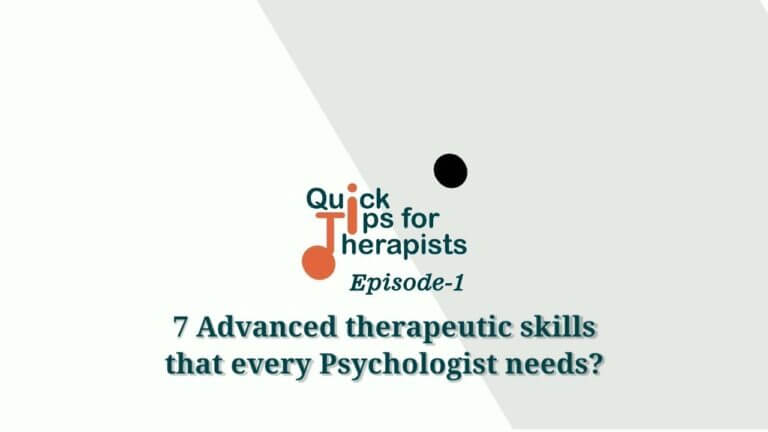Are you a psychologist or a change agent who understands the importance of developing advanced therapeutic competencies or skills, then this post is for you…
Before we look at what these therapeutic skills are, go ahead, follow us so that we can share more such videos with you in the future.
I want you to take a moment and think, what according to you are the key therapeutic expertise that a psychologist needs?
I am sure you are thinking about listening skills, questioning skills, rapport building, empathy, and unconditional positive regards.
And you are right from a conceptual point of view but let us talk about the advanced therapeutic skills that will help you apply these skills to get desired results.
Basic Therapeutic Skills

You would use basic therapeutic skills to help clients:
- Define their problem clearly and precisely
- Identify and define their desired outcome that they resonate with
- Develop motivation that is intrinsic and not dependent on external factors
- Understand exactly what needs to be done to channelise their motivation towards resolving their problem or achieving their desired outcome.
Advanced Therapeutic Skills
You will also need to help clients with advanced therapeutic skills:
- Explore the deeper issues like thoughts, emotions, beliefs, values, defence mechanisms, positive intentions, traumas and past experiences including the ones that maybe repressed and help them resolve these deeper issues effectively
- Become mindful of the positive changes that are taking place in their life and notice the journey they have been able to make from where they were to where they are now and lastly
- Develop this expertise to be able to sustain these changes without being dependent on you in the long run
Makes sense, No?
Let us pause for a moment and think about it….
If you have all this expertise and you are able to help the clients do all of this, wouldn’t you say you have not just developed but mastered advanced therapeutic skills?
And think about the response of your client, the expression on their face as they experience these changes.
The way your client will feel at the end of the sessions and…….
The way you will feel….
It would be wonderful. Something that you would love, wouldn’t you?
I am sure now that you know these skills, you are wondering how do you develop this expertise effectively?
How to develop advanced therapeutic skills is one of the most important questions that almost all therapists looking at creating an emotionally and financially fulling career need an answer for and that is exactly what we will look at next.
Step by step guide to developing advanced therapeutic skills
- Be open to learning more. Remember the field of psychology is vast and literally never-ending, you can always learn more. What people thought could take years in therapy at one point can now be achieved in a matter of months and in some cases if you know the right techniques even in a matter of weeks or days.
- Start following therapists and institutes that regularly create content on concepts and techniques that you can use in your practice. If you haven’t already, obviously start by following ICHARS first. Here are a few other channels on youtube that I would highly recommend:
- ICHARS (@icharsonline on fb, insta, linkedin, Youtube)
- The Milton H. Erickson Foundation (ericksonfoundation on youtube)
- Therapy Playground (TherapyPlayground on youtube)
- Deep Eddy Psychotherapy on youtube
- Beck Institute on youtube
- Accept and acknowledge that there is a difference between theoretical conceptual knowledge and practical skills that you will need to use in your practice. While theoretical concepts are very important and you may have a stronghold over them as a result of your MA, Mphil or even PhD, it is still important to separately focus on developing practical skills that you can learn via experience.
- Check out different certification courses. My recommendation is to do at least one course that focuses on practice-based learning in each of the major approaches to psychotherapy i.e. cognitive therapy, behavioural therapy, humanistic approach and psychodynamics or you may just enrol for the Comprehensive Cognitive Hypnotic Psychotherapy Program that is a unifying approach to psychotherapy.
- Connect with other psychologists, join a psychologist support group. Participate in the meetings, join case discussions, share with and learn from other practising psychologists.
- If you are pursuing your masters or have just recently completed your masters, do an extensive internship or fellowship of at least a year. One month or two-month internship may be good for initial exposure or conceptual clarity but you wouldn’t really get much practical exposure during the same. I understand that most of the internships in psychology require the intern to pay and that can be a hindrance but think of it as an investment in your future.
- Conduct due diligence. Since attending the course and doing an internship is like an investment in your future, take the precautions you will take with any other investment. When it comes to courses ensure that the course is not just about theory and concepts it includes practical training.
- Ensure that the training institute offers post-workshop support and that you are not left to fend for yourself after the training. When it comes to internship check that extensive practical training and exposure to working with at least some real-life clients is a part of the internship or fellowship.
- Speak to the trainers or the mentors, go through the existing content that is available on their social media channels or websites and the type of work they do.
- Differentiate between skill and state. If you have been attending multiple courses but still do not have the confidence to work with clients, this may not be a skill related issue but an issue related to mental state and emotional state. Use visualisation and imagery for practising the techniques and skills you have developed during these courses. Visit your mental health practitioner who can help you develop confidence.
I hope you have found these tips on developing advanced therapeutic skills useful and that you will begin to follow them from today itself. If you are looking for free resources, I would suggest checking the ICHARS blogs and getting started with the comprehensive masterclass on eclectic therapy, that is currently available for free on youtube.
You can also enrol for the eclectic psychotherapy foundation course to get a certificate after completing the course.
To be notified about new videos in this series do follow us on social channels and subscribe to our newsletter. If you have liked this post and found it useful, do share the post with others.

